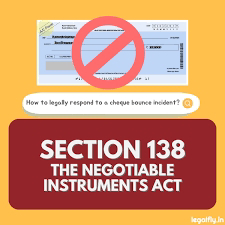Section 138 NI Act: Proceedings in absence of accused possible if accused does not appear or does not seek exemption from personal appearance - Bombay High Court
The Bombay High Court held that a magistrate is justified in proceeding with trial proceedings for an offence under Section 138 of the NI Act in the absence of the accused and without recording the statement under Section 313 of the CrPC, if the accused or his counsel is not attending the trial or the accused has not sought personal appearance. Justice SM Modak said that before exercising such power, the trial court may consider the following factors:
*The number of times the accused has been absent.
*The steps taken by the complainant to secure the presence of the accused.
*The reason why presence could not be secured.
*Whether all means permissible as per law were exhausted.
The court was considering revision applications against conviction under Section 138 read with Section 141 of the NI Act. The complainant (respondent no.2) filed a complaint against two directors of a company for bouncing two cheques of Rs. 1 crore. Initially, the directors appeared before the Magistrate.
However, thereafter both the directors and their counsel remained absent.
The Magistrate proceeded with the trial under Section 313 of CrPC without recording the statements of the accused and also recorded evidence without their presence.
The Magistrate then convicted the directors under Section 138 read with Section 141 of the NI Act and sentenced them to simple imprisonment for one year and fine of Rs. 2 crore. Thereafter they filed an appeal, however, the appellate court confirmed the order of the Magistrate. The appellate court noted that the accused were continuously absent on six occasions and even their counsel was not present.
The directors/applicants argued that the complainant did not try to ensure their presence and the Magistrate failed to record their statements under Section 313 CrPC and as such, they were deprived of the opportunity to explain the evidence against them.
Referring to several decisions of the Supreme Court and the High Court, the Court held that the Magistrate can proceed without the presence of the accused and record the statement under Section 313 CrPC for the offence under Section 138 NI Act.
It arrived at this view in view of the 'quasi-criminal nature' of cases under Section 138 of the NI Act. It referred to P. Mohanraj and others v. Shah Brothers Ispat Pvt Ltd (LL 2021 SC 120), where the Supreme Court termed Section 138 as a 'civil sheep' in 'criminal wolf's clothing' and held that the provision is meant to enforce a civil remedy in the form of a 'quasi-criminal proceeding'.
In view of these observations of the Supreme Court, the High Court remarked, "In short, if the proceedings under Section 138 of the Negotiable Instruments Act are quasi-criminal in nature, there is reason to believe that the feature of a criminal trial regarding recording of statement under Section 313 of the CrPC does not apply.
The Court thus held that the Magistrate is justified in proceeding without the accused if he has been absent without any justification. In the present case, the Court held that there was no illegality in the orders of the Magistrate and the Sessions Court and dismissed the revision applications.





Post a Comment